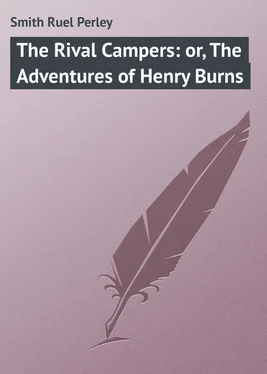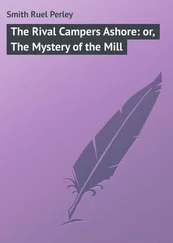Ruel Smith - The Rival Campers - or, The Adventures of Henry Burns
Здесь есть возможность читать онлайн «Ruel Smith - The Rival Campers - or, The Adventures of Henry Burns» — ознакомительный отрывок электронной книги совершенно бесплатно, а после прочтения отрывка купить полную версию. В некоторых случаях можно слушать аудио, скачать через торрент в формате fb2 и присутствует краткое содержание. ISBN: , Жанр: foreign_prose, foreign_children, на английском языке. Описание произведения, (предисловие) а так же отзывы посетителей доступны на портале библиотеки ЛибКат.
- Название:The Rival Campers: or, The Adventures of Henry Burns
- Автор:
- Жанр:
- Год:неизвестен
- ISBN:http://www.gutenberg.org/ebooks/40548
- Рейтинг книги:5 / 5. Голосов: 1
-
Избранное:Добавить в избранное
- Отзывы:
-
Ваша оценка:
- 100
- 1
- 2
- 3
- 4
- 5
The Rival Campers: or, The Adventures of Henry Burns: краткое содержание, описание и аннотация
Предлагаем к чтению аннотацию, описание, краткое содержание или предисловие (зависит от того, что написал сам автор книги «The Rival Campers: or, The Adventures of Henry Burns»). Если вы не нашли необходимую информацию о книге — напишите в комментариях, мы постараемся отыскать её.
The Rival Campers: or, The Adventures of Henry Burns — читать онлайн ознакомительный отрывок
Ниже представлен текст книги, разбитый по страницам. Система сохранения места последней прочитанной страницы, позволяет с удобством читать онлайн бесплатно книгу «The Rival Campers: or, The Adventures of Henry Burns», без необходимости каждый раз заново искать на чём Вы остановились. Поставьте закладку, и сможете в любой момент перейти на страницу, на которой закончили чтение.
Интервал:
Закладка:
Then they carried the canoe down to the shore, launched it, and set off. It was about one o’clock in the morning. They paddled away from the tent and down along the shore, noiselessly as Indians. Past the village and past the cottages, and not a sign of life anywhere, not even a wisp of smoke from a chimney. The canoe glided swiftly along, making the only ripples there were on the glassy surface of the bay.
As they came to the beach near Harvey’s camp, they landed, and Tom crept up over the bank to reconnoitre. He came back presently, reporting that the crew were all sound asleep, and everything quiet around the camp. Then they paddled quickly by the end of the bluff and along the bold shore beyond, picking their way carefully among the reefs, as they could not have done in these unknown waters with any other craft than the buoyant canoe.
They disembarked at the clump of cedars, and made the canoe fast to the trunk of one that overhung the water. Tom took from the bow of the canoe a lantern, and they scrambled up the bank. Throwing aside the boughs, they disclosed the trap-door, which they lifted up. Tom lit the lantern and they entered the cave.
They found it much larger than the opening indicated. It was excavated from the hard clay of which the bank was composed, and, though not high enough for them to stand quite erect, it was about eight feet long and five feet wide.
It was filled with stuff of all sorts. There were spare topsails and staysails, – possibly from coasters that had anchored in the harbour, – sets of oars from ships’ boats, several boxes of canned goods, that the grocer of the village had hunted for far and wide, coils of rope, two shotguns, carefully wrapped in pieces of flannel and well oiled, to prevent the rust from eating them, four lanterns, two axes and a hatchet, and odds and ends of all descriptions useful in and about a camp or a yacht.
The roof of the cave was shored up with boards, supported by joists. In one corner of the cave was the box for which they sought, broken into, and with the gorgeous cake gone; but that was all. The rest of the contents were untouched.
They took the box, carried it down to the shore and placed it in the canoe. Tom started to return to the cave.
“What are you going to do now, Tom?” queried Bob. “We don’t want to take anything of theirs, of course.”
“Not a thing,” answered Tom. “We don’t go in for that sort of business, but I just want to show them that we have been here and had the opportunity to destroy anything that we were of a mind to. Perhaps it will teach them a good lesson. It will show them that we are as smart as they are, anyway.”
So saying, Tom began to gather up the guns, the good sails, the boxes of provisions, and other things of value, and carry them outside the cave, setting them down on the bank at some distance from the mouth of it.
“We won’t destroy anything of value,” said Tom. “But here are some odds and ends of old stuff, some of these pieces of oars, empty crates, bagging, and that sort of thing, which will make a good blaze, and which would have to be thrown away some day. They are of no use to anybody. I propose to make a bonfire of these in the cave, just to show Jack Harvey that we have been here. He’ll find all his stuff that’s good for anything put carefully outside the cave, and no harm come to it. But he’ll be just as furious to find his cave discovered and on fire, for all that.”
“All right,” said Bob, “here goes.”
Bob was thinking of that cake.
Tom took one of the axes and chopped a small hole in the top of the cave, some distance above the door.
“That will make a draught,” he said, in answer to Bob’s inquiry.
Then he blew out the lantern and poured the oil with which it was filled over the pile of rubbish. There was still a small heap of stuff in one corner of the cave, some old boards, and a few pieces of sail, thrown carelessly in a pile, as though of no value. They did not stop to bother with these, as they seemed of no consequence, and they were in a hurry.
Tom struck a match and set fire to the heap that he had accumulated.
“We can’t get away from here any too soon, now, Bob,” he said. “There’ll be some furious chaps out here, when that fire gets to crackling and smoking. We don’t care to be about here at that time. They are too many for us.”
The boys scrambled down the bank, got into the canoe, and pushed off. As they paddled away, the light of the fire gleamed in the mouth of the cave. As soon as they had gotten clear of the reefs, they did not stop to reconnoitre the camp, but pushed by at full speed. It was a race against fire – and they little dreamed of its swiftness, nor of the hidden force which they had let loose.
Along the shore they sped, speaking not a word till they had got the village in sight and their arms were cracking in the joints. Then they paused a moment for breath, for their little craft was out of sight of the camp now, in the dull morning light.
Tom, who had the stern paddle, had looked back from time to time, but if there was any light to be seen through the bushes it was very slight. The spot was hidden now, too, by the intervening point of land.
“I don’t know whether I see a light or not,” he said. ”There’s a lot of smoke, though, and I can imagine, anyway, that I see a gleam of fire in the midst of it.”
The words were scarcely out of his mouth before he swung the canoe around with one quick sweep of his paddle.
“Look, Bob! Look!” he cried. “What have we done?”
The sight that met their eyes was amazing.
A sheet of flame shot suddenly into the sky. It looked like a tiny volcano, belching up fire and débris and pushing up through the midst of it a great black canopy of smoke. This was followed by the report of an explosion that echoed and reëchoed through the village, reverberating on the rocks across the harbour, and filling the whole country around with its noise – at once startling and terrifying. Then the light as suddenly went out, a shower of burning sticks and shreds of blazing canvas drifted lazily down through the air, and a cloud of smoke hung over the spot.
Tom and Bob trembled like rushes. It seemed as though every particle of strength had left them. There could be but one conclusion. They had blown up the camp. Harvey and all his crew were, perhaps, killed.
Bob was the first to speak.
“Come, Tom,” he said. “We must get to camp before we are seen. Brace up and try to paddle.”
Somehow or other they got to camp and dragged the canoe ashore. They carried the box up to the tent and locked it up in the big chest. Bob’s hand trembled so he could hardly put the key into the lock.
Tom seated himself, dejectedly, on the edge of one of the bunks, the picture of despair.
“I guess I may as well go and give myself up first as last,” he said. “I suppose I’ll have to go to jail, if they’re killed. What can there have been in the cave? I didn’t see anything to explode, did you?”
“No,” answered Bob, “unless it was something over in that pile of stuff in one corner. I didn’t examine it, but they must have had something stored or hidden underneath there, either kerosene or gunpowder. By Jove! Tom, I remember now hearing Captain Sam Curtis say he had missed a keg of blasting-powder that he had bought for the Fourth of July, and he said he thought some of the sailors down the island had stolen it. That’s where it went to; it was hidden in that corner.”
“That doesn’t help matters much, if they’re all dead,” said Tom. “I’ll be to blame, just the same. Oh, Bob, what shall I do?”
“Whatever you do,” answered Bob, “I stand my share of it, just as much as you. I’m just as guilty as you are. But don’t go to pieces that way, Tom. We don’t know yet whether they are hurt or not. The best thing we can do is to get down there as quick as ever we can. Shall we take the canoe and make a race for it?”
Читать дальшеИнтервал:
Закладка:
Похожие книги на «The Rival Campers: or, The Adventures of Henry Burns»
Представляем Вашему вниманию похожие книги на «The Rival Campers: or, The Adventures of Henry Burns» списком для выбора. Мы отобрали схожую по названию и смыслу литературу в надежде предоставить читателям больше вариантов отыскать новые, интересные, ещё непрочитанные произведения.
Обсуждение, отзывы о книге «The Rival Campers: or, The Adventures of Henry Burns» и просто собственные мнения читателей. Оставьте ваши комментарии, напишите, что Вы думаете о произведении, его смысле или главных героях. Укажите что конкретно понравилось, а что нет, и почему Вы так считаете.












